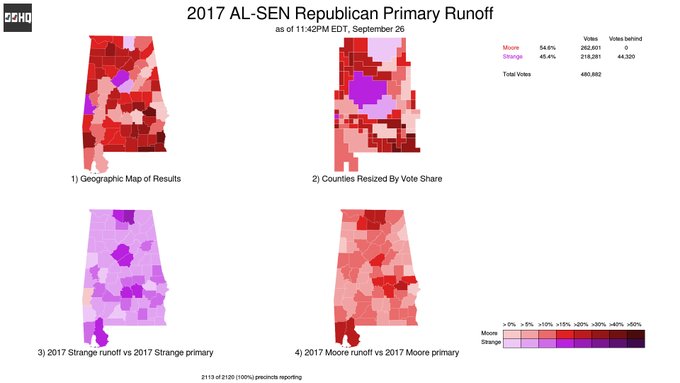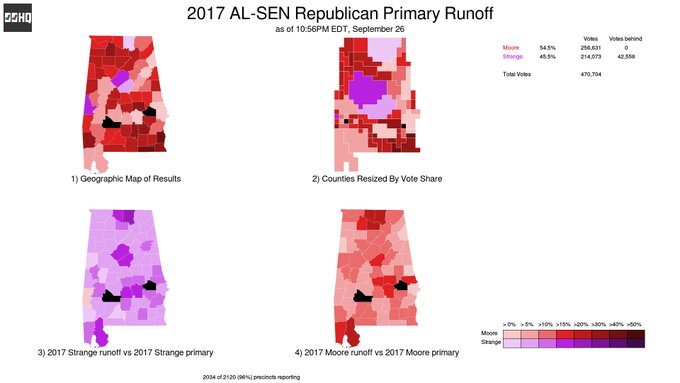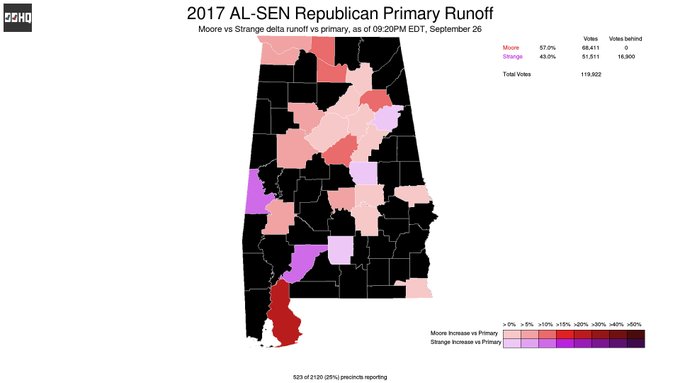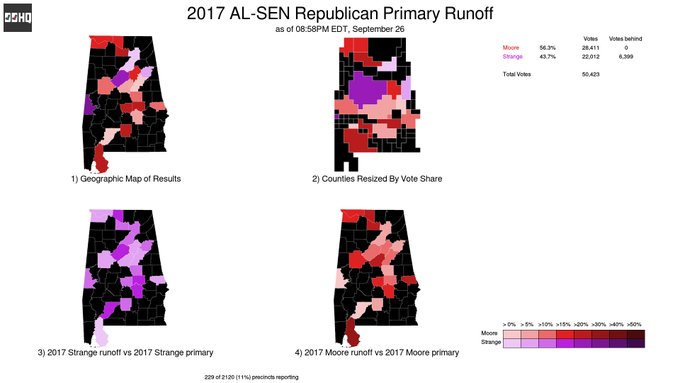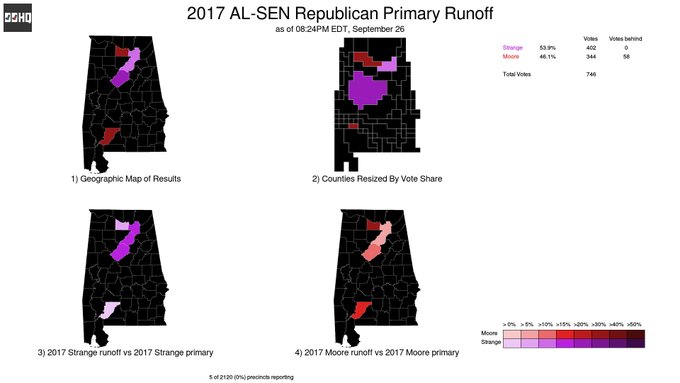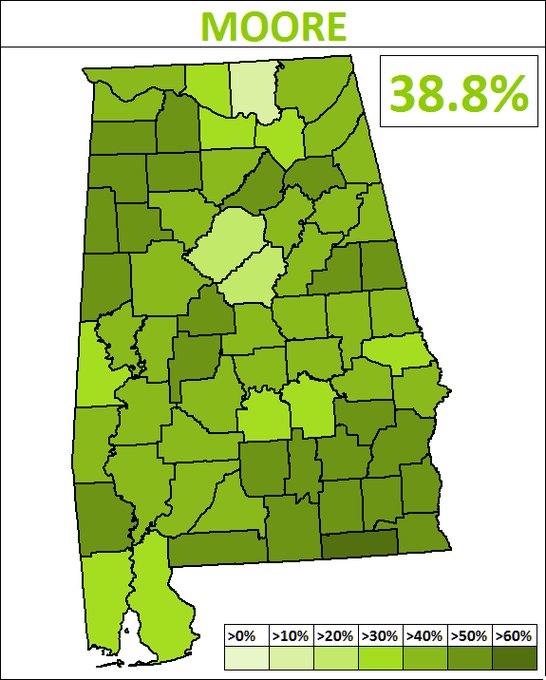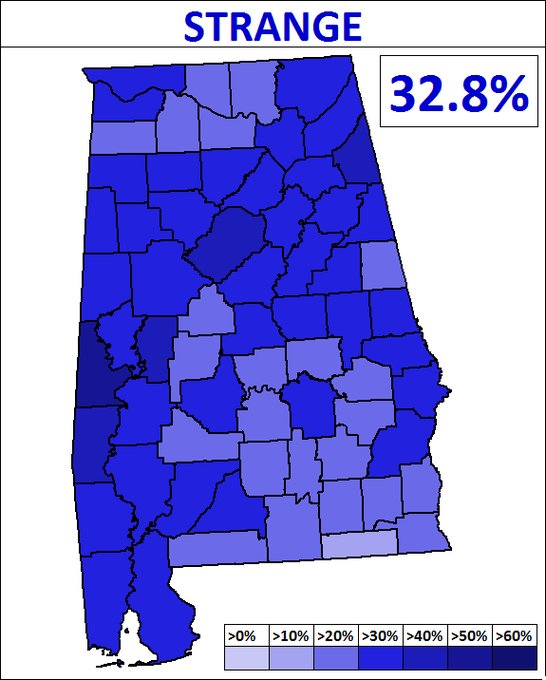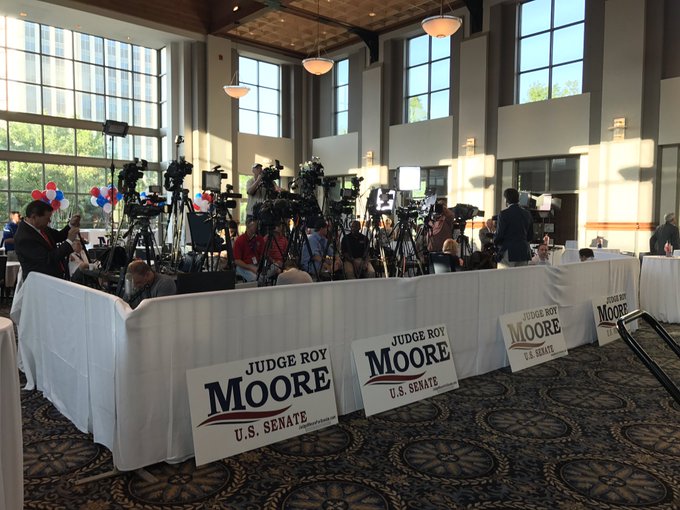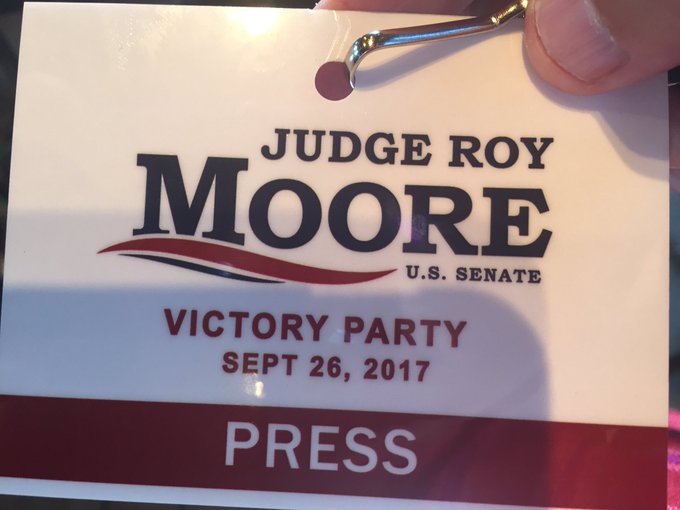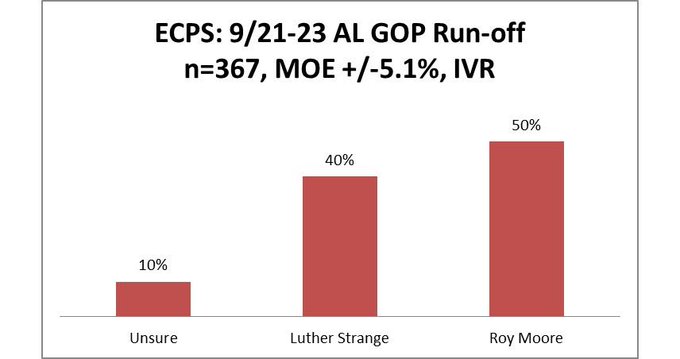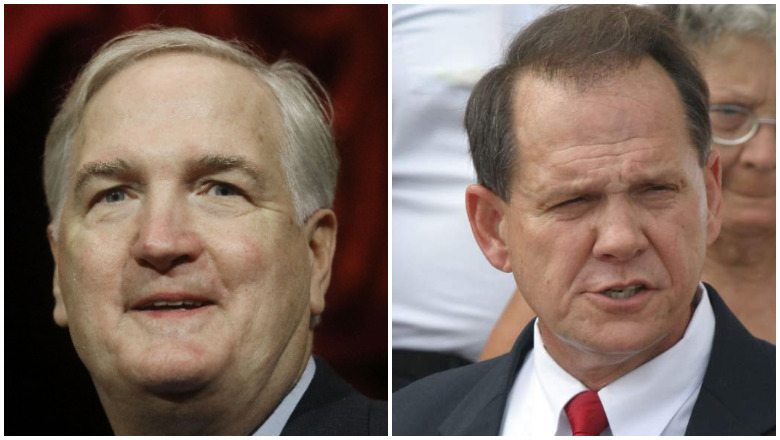
Roy Moore, the controversial former Chief Justice of Alabama’s Supreme Court who ran as the anti-establishment candidate in the race for Jeff Sessions’ former Senate seat, defeated the Donald Trump-endorsed, short-term incumbent, Luther Strange in the primary, The Associated Press and a prominent election tabulating site say.
(Note: Alabamans headed to the polls on December 12. This article was on the primary. You can read live election results and updates for the December 12, 2017 contest here.
In the primary, Moore won by 9 percent when all votes were counted.
The AP called the race around 8:30 p.m., as Moore was building a seemingly insurmountable lead (12% in with one-third of the votes counted when the race was called.)
Moore, the Republican nominee, now moves on to challenge Democrat Doug Jones in the general election on December 12. See updated, live election results and updates below. Although some say a Strange loss is a sign that Trump’s ability to move the GOP base is waning, the race has this odd overlay: Moore, with his bombastic rhetoric and anti-establishment themes (and establishment opponents like Senate Majority Leader Mitch McConnell, who endorsed Strange) is a lot more like Trump in style than is the less theatrical Strange himself. Thus, the president is supporting the guy who seems least like him.
Moore even pulled out a handgun at a campaign rally the night before primary election day. Moore also rode a horse to the polls.
Moore, who once defied an order to remove a Ten Commandments monument, was the favorite going into the September 26 runoff election after breaking out a lead in the polls. Strange was named to the seat by the scandal-plagued former governor.
The race is being closely watched for several reasons. Most notably, Trump’s support for the establishment candidate, Strange (VP Mike Pence stumped for him too), but even Trump conceded before the polls closed that he didn’t think Strange would win, dialing down expectations. His former White House strategist, Steve Bannon, supported Moore. Senate Majority Leader Mitch McConnell – whom Trump has dogged with criticism – supported Strange.
You can see live, updated election results here from Decision Desk HQ. The results will constantly refresh as they come in (the polls are now closed):
At 8 p.m., the election tabulating service projected that Moore would win:
Watch live analysis here:
Some analysts think a Moore victory gives Democrats more of an opening – albeit, slim, due to Alabama’s past voting history – because of Moore’s history of bombastic rhetoric and the close margin of the last race he ran in Alabama, for the State Supreme Court, in 2012. However, Alabama is a state where Trump enjoys high levels of support, as does the GOP.
Strange’s weakening support also has a lot to do with localized issues, including tensions between him and some establishment Republicans in Alabama, and the way in which he was named to the seat. Some people were trying to say that a Moore win was a victory for Trump’s agenda, even though Trump endorsed Strange. That’s because Moore seized on a lot of the successful themes from Trump’s own race.
LIVE UPDATES
UPDATE, 8:30 p.m.
The Associated Press called the race for Moore.
Moore had a 12% lead at that time.
UPDATE, 8:18 p.m.
Moore was starting to catch up to Strange in Strange’s home county.
Strange had a weaker showing in the suburban area of Shelby County.
Reminder: This is what Trump said about Strange on election morning: “Luther Strange has been shooting up in the Alabama polls since my endorsement. Finish the job – vote today for ‘Big Luther.'”
UPDATE, 8:30 p.m.
An hour after the polls closed, Moore’s lead was growing.
UPDATE, 7:50 p.m.
Moore is doing well in areas that Mo Brooks represents; that’s a good sign because he needs people who voted for Brooks in the three-way primary to switch to him, not Strange.
Moore’s doing well in areas where Trump campaigned for Strange, too.
UPDATE, 7:26 p.m.
The view at Strange’s party:
Meanwhile, with some rural areas coming in, Moore’s getting closer.
UPDATE, 7:22 p.m.
The first returns put Strange ahead, but they added up to only a few votes, which doesn’t mean anything for the final outcome.
UPDATE, 7:07 p.m.
Moore’s last election was in 2012 for Alabama Supreme Court. It was a lot closer than Mitt Romney’s percentages in the state for president, showing what Democrats perceive as a possible opening (albeit an uphill one) were they to face Moore in the general.
During the three-way primary for the Senate seat, Moore did best in rural areas.
Strange and Moore ended up in a runoff because they split the vote in the primary with Republican Mo Brooks, with Moore in first. One of the wildcards: Where the votes for Brooks would go. Turnout is also a factor, with low turnout perceived to help Moore. Due to his history of controversial comments, some think Moore would provide a lot of fodder for Democrats in the general election, although some recent polls show him defeating and doing better against Democrat Doug Jones than Strange does.
UPDATE, 7 p.m.
The polls are now closed.
Here’s a picture of Moore on his horse.
Here’s a picture from his party:
UPDATE, 6:53 p.m.
Moore’s backers were so confident they were calling his runoff night bash a “victory party.”
UPDATE, 6:50 p.m.
Moore’s gun moment is getting some attention.
According to The Hill, on Monday night, Moore “pulled out a handgun during a campaign rally.” He was trying to make a point that he’s been subjected to false campaign ads alleging he doesn’t support the Second Amendment, the Hill reported. He pulled out the gun and said, “I believe in the Second Amendment,” according to the Hill.
Watch video of the moment:
UPDATE, 6:38 p.m.
Politico is reporting that, the night before the election, Trump said that he thinks Moore will win. “Trump told conservative activists who visited the White House for dinner on Monday night that he’d underestimated the political power of Roy Moore, the firebrand populist and former judge,” according to Politico.
UPDATE, 6:25 p.m.
What did the polls say?
The polls right before election day showed Moore with a large lead over Strange. The RealClearPolitics polling average shows Moore with a 10.4 percentage point lead over Strange, as of September 25. Moore has led in polling since August, but the margin has jumped in his favor in recent weeks. (You can see the specific polls later in this article.)
Although Trump has tossed support to Strange, polling has shown that those who approve of Trump make up the largest portion of Moore’s supporters. The same is true of Strange, though. After all, it’s a GOP primary. The Optimus poll found that most people know that Trump endorsed Strange.
“Trump’s endorsement of Strange never made a lot of sense from either a messaging or policy standpoint. Trump ran as an outsider,” FiveThirtyEight noted. “Strange is an incumbent U.S. senator backed by Senate Majority Leader Mitch McConnell and the pro-McConnell Senate Leadership Fund. He’s the ‘establishment’ candidate. Strange’s opponent Moore, on the other hand, is a lot more like Trump. Both Moore and Trump are populist politicians who have made a political career by running against the establishment.”
Here’s a round up of the latest polls in the primary:
Trafalgar Group (9/23-24)
| Moore | 57% |
| Strange | 41% |
Optimus (9/22-23)
| Moore | 55% |
| Strange | 45% |
Emerson (9/21-23)
| Moore | 50% |
| Strange | 40% |
Gravis (9/21-22)
| Moore | 48% |
| Strange | 40% |
Fox 10/Strategy Research (9/20)
| Moore | 54% |
| Strange | 46% |
Doug Kaplan, the managing partner of Gravis Marketing, which conducted one of the recent polls, stressed, “The dynamics can change if the undecideds break towards Strange. Then, there is the factor of how many show up. It’s illegal for Democrats to vote if they voted in the Democratic primary last month, so Strange has to get new Democratic voters, who did not vote in the primary to show up for him.”
CNN reports that a Moore win could be a canary in the mine for other races, most notably primary fights in Nevada and Arizona.
Kaplan added, “Another factor working for Moore is his lead with both voters with a favorable opinion and unfavorable opinion of Trump.”
Moore was the top vote getter on the Republican side in the Alabama Senate Special Election during an earlier primary but not by a big enough margin to avoid a runoff.
The seat was once occupied by Sessions, who left to become Trump’s Attorney General.
According to USA Today, “Strange and the McConnell-aligned Senate Leadership Fund (SLF) spent a combined $10 million on the campaign through Sept. 6, and even more in the weeks after. Moore’s campaign spent just $1.1 million through early September.”
Moore was removed as Alabama’s chief justice in 2003 “for refusing to remove a monument to the Ten Commandments,” reports FiveThirtyEight. The Moore saga doesn’t end there, though. After being removed as chief justice, he won reelection. However, he was then “suspended for declining to enforce the 2015 U.S. Supreme Court decision that legalized same-sex marriages. After losing an appeal, he resigned in April,” reports Politico.
Moore, a former prosecutor, judge, and military police officer in Vietnam, has a history of making controversial remarks. According to Politico, he told The Guardian that Vladimir Putin is “maybe … more akin to me than I know” because Putin opposes gay marriage, and, of transgender troops, he said, “If we’re going to file for hormone treatments and medical surgeries, that’s not making your military stronger. You’ve got to have a disciplined military.”
On the Democratic side, the race was always a bit of a Hail Mary; according to Five Thirty Eight, “No Democrat has won a Senate race in Alabama since 1992, and Trump won the state by 28 percentage points last November.”
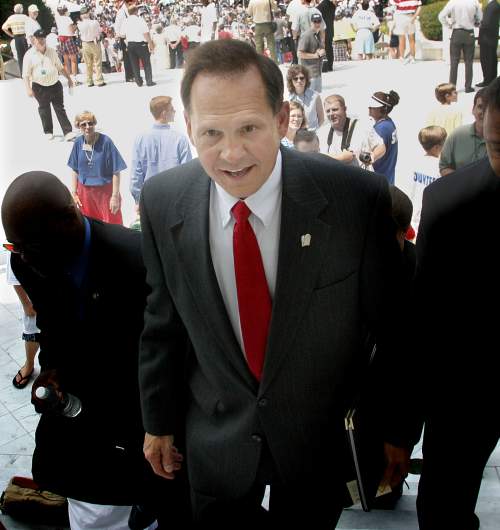
GettyAlabama Chief Justice Roy Moore leaves a rally in support of a monument of the Ten Commandments August 16, 2003 in Montgomery, Alabama.
Adding another twist, turnout is expected to be low. According to The New York Times, a low turnout would be good for Moore, many experts believe, because “his defiance has only endeared him to his supporters, who are highly likely to show up to vote in any contest where he appears on the ballot.” Moore’s support with Evangelicals also would help him in a low turnout race because they tend to turn out in greater numbers.
There are also the localized concerns. Some observers say that Strange is struggling to hold onto the seat in part because he’s had tense relationships with some in the Republican establishment in Alabama as well as dealing with continued fallout over the fact he was appointed to the seat by former Gov. Robert Bentley, who was being investigated by the Alabama Attorney General’s office at the time Strange was interviewed for the Senate post. Strange was the state’s Attorney General at the time of his appointment to the Sessions’ Senate seat.
